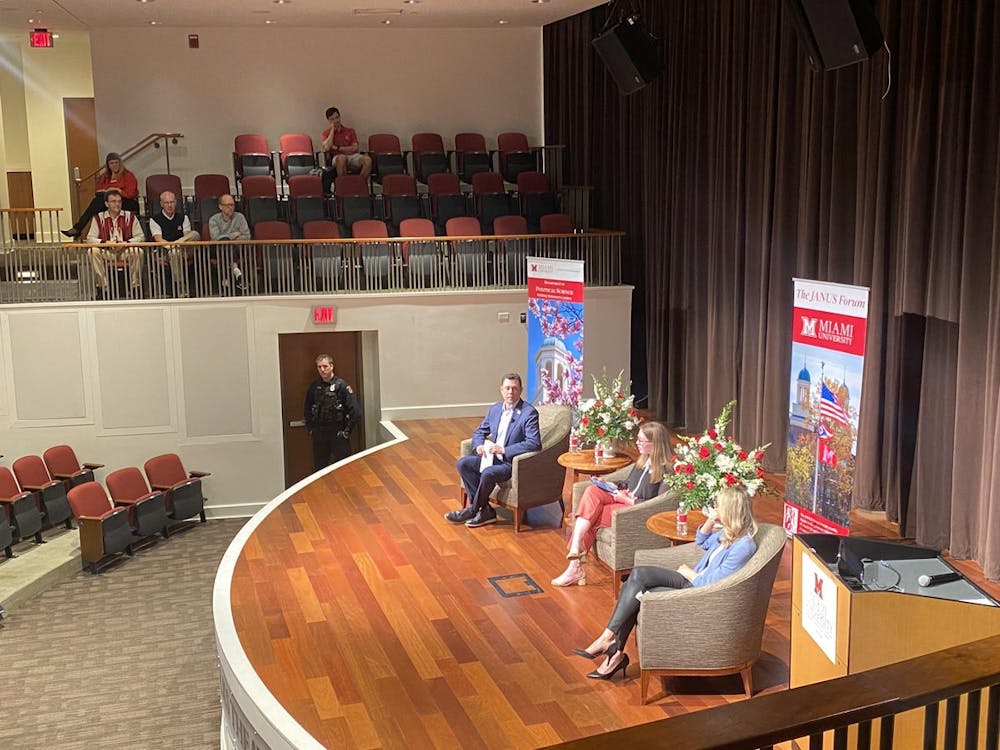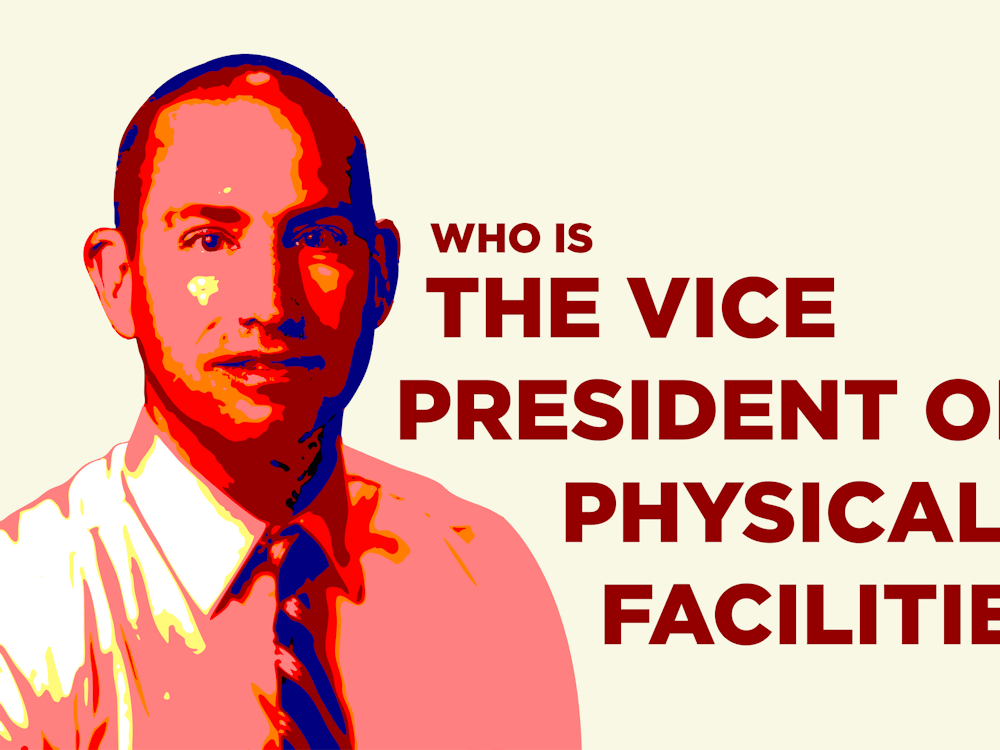Is it time to kill the death penalty? That’s what this year’s JANUS forum aimed to answer. The JANUS forum is a semesterly event hosted by Miami University’s political science department that aims to provide a space for the discussion of opposing views on pertinent issues.
The spring 2023 forum took place on Mar. 1 in Wilks Theater and discussed whether the death penalty should still be used today. The event was moderated by JANUS Forum President Cameron Tiefenthaler.
The death penalty still exists in 27 states, including Ohio.
Jason Chaffetz, a former U.S. Representative for Utah and Fox News contributor, and Laura Nirider, an associate professor of law and co-director of the Center for Wrongful Convictions at Northwestern Pritzker School of Law, debated the pros and cons of using the death penalty.
“There is a small set of people who do something that is so heinous, and so anti-human, so evil to its core,” Chaffetz said. “And I want you to ask yourself, what is the right form of justice?”
Chaffetz illustrated his point by telling the story of Dylan Roof, a white supremacist that killed nine Black people in the 2015 Charleston church shooting.
“He sat with these people and he prayed with these people, went to Bible study with them,” Chaffatz said. “And then he decided to take out his gun and murdered nine of them. Because he wanted to start a race war.”
Chaffetz said the abundance of evidence, Roof’s confession and lack of remorse, and the heinousness of the crime warrant the pursuit of capital punishment.
“There are some people, very few people, where the right form of justice is the death penalty,” Chaffetz said. “I’m not here to argue that it’s a deterrent, but the Supreme Court has ruled that it is a form of punishment that is just in some cases.”
Nirider began her opening statement with a story of Henry McCollum and Leon Brown, two Black teenagers who were wrongfully convicted of murdering an 11-year-old girl and sentenced to death.
After challenging their convictions for decades, DNA testing eventually found the true culprit, proving the innocence of the pair after they had spent 30 years in prison. Nirider said exonerations of death row inmates are common.
“For every eight people we execute in America, one person is exonerated,” Nirider said. “A one-in-nine error rate. No system is perfect, but this penalty is irreversible.”
Enjoy what you're reading?
Signup for our newsletter
Nirider opposes the death penalty not only because of the prevalence of human error but also because of its geographic concentration.
“In this country, five prosecutors are responsible for 440 of our death sentences right now,” Nirider said. “Whether you get the death penalty doesn’t depend on some abstract notion of justice; it depends on what county you’re in.”
Another issue debated at the forum was over the lengthy and expensive conviction and appeals process that death penalty cases often require.
“The average time that it takes between conviction of a case and an actual execution is 19 years; that is far too long,” Chaffetz said. “I’m not saying we should speed through it, but there are cases where there’s video and DNA evidence and they admitted it.”
Chaffetz fears that lengthy appealing processes could lead to inmates being released from prisons due to overcapacity. He mentioned the story of Willie Horton, a convicted felon who committed violent crimes while on furlough from prison, where he was serving a life sentence without parole.
Nirider, however, said this type of occurrence is extremely rare.
Chaffetz said that because DNA evidence is now widely used, there aren’t as many wrongful convictions as in previous decades, therefore a long appeals process is no longer necessary.
Nirider countered by saying DNA evidence is actually only available for a “tiny, tiny fraction” of cases, and the wrongful conviction rate is still “astonishingly high.” She said the years-long duration of these cases are essential to combat this.
“The idea that we need to shorten the appeals process and kill people faster and sooner, before the courts have had a chance to vet their claims, before witnesses have had a chance to come forward, that is something I think will contribute to the problem of wrongful convictions,” Nirider said.
Another problem the death penalty poses involves the logistics of executing someone. Nirider said lethal injections, the method used in Ohio, can take two to four hours to carry out.
“We know of botched executions in which the drugs were bought off label by the government because pharmaceutical companies didn’t want to sell them the drugs to be used to kill people,” Nirider said. “People who took 20 minutes on the table choking, sputtering.”
Nirider said the prison guards who administer these executions are often traumatized and experience alarming rates of suicide, alcoholism and drug use. She said we should be cautious giving the government the power to decide “who gets to live and who gets to die.”
Chaffetz argued that it’s not the government making that decision — it’s the jury. If the victim’s family, the prosecutor and a jury of peers are all in agreement that corporal punishment is appropriate, Chaffetz said, then that would be justice.
Nirider disagreed.
“In a capital case, if you don’t believe the death penalty is a just punishment, you’re not allowed to serve on a jury,” Nirider said. “So you’re only left with people who are pro-death penalty.”
Nirider noted that this form of jury selection often disqualifies women, people of color and Evangelical Christians, all of whom tend to oppose the death penalty.
Nirider added that the long duration that comes with pursuing a death sentence has a devastating impact on victims, who are forced to relive their trauma.
“That’s more times in court [the victims] are facing this person who did this harm. It goes on for years and years,” Nirider said. “Because of that, this person becomes a focus for the victim’s family rather than someone they can do their best to forget in that locked prison cell.”
Lastly, both speakers invoked moral grounds for their stance on the death penalty.
“I’m a big believer in restitution. If you break someone’s window, you gotta fix it,” Chaffetz said. “So what is justice to you for taking a life? That’s the seminal question before us. For a lot of people, life without parole is the right thing, but I believe for the most heinous of cases [the death penalty] should be on the table.”
Nirider said we should take a moral high ground rather than sink to the killer’s level.
“I don’t oppose the death penalty for killers because they’re better than that. I oppose the death penalty because we’re better than that. We are better than behaving on the same level as Dylann Roof.”
Grace Gaston, a sophomore political science and independent study double major, said part of her decision to attend the event was for extra credit for a class, but she also wanted to learn more about the issue.
“They weren’t necessarily arguing with each other [but instead] touched on each other’s points and where they agreed and disagreed,” Gaston said. “I think they did a great job in acknowledging each other’s point of view and those of other people as well.”
Gaston said although she leans more liberal on the death penalty, Chaffetz’s arguments forced her to think more deeply about the issue.
“[Chaffetz] brought up a lot of great points about violence, crime and the prolonged amount of time inmates spend in jail, and that was something I’ve kind of been weighing back and forth on.”
Jack Fitzpatrick, a first-year political science major and a member of the JANUS forum, said the event showcased the benefits of having a public space to debate political topics
“It’s always nice to be able to discuss these issues at a public forum,” Fitzpatrick said. “I thought it was really civilized, a really genuine debate.”




